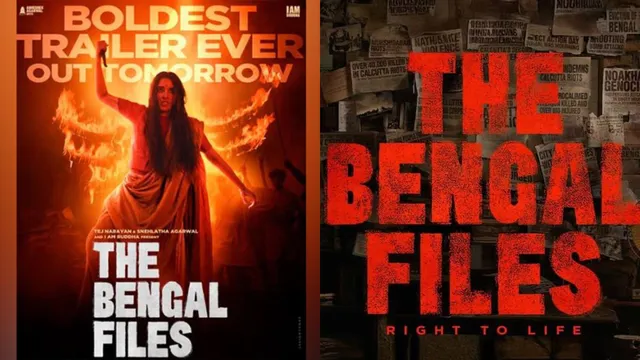- By Soumyaroop Mukherjee
- Mon, 08 Sep 2025 06:33 PM (IST)
- Source:JND
The Bengal Files: In a relief to the controversial movie by Vivek Agnihotri, ‘The Bengal Files’, the Calcutta High Court on Monday dismissed a petition filed by Santanu Mukherjee, Gopal Chandra Mukherjee’s grandson, challenging his grandfather’s depiction in the film.
The plea was lodged to investigate “what standards were followed and which board members took part in evaluating the suitability of the movie" as quoted by the Live Law. He also demanded a probe into his request that during the entire tenure of the investigation, Agnihotri should step down as a Central Board of Film Certification (CBFC) Board Member.
The film, which depicts the horrors faced by the people of Kolkata during the Great Calcutta Killings of 1946, has gathered storm online since its countrywide release on August 5. However, the movie, which won't be released in West Bengal owing to its sensitive nature, has not done so well at the box office.
Who Was Gopal Patha?
Gopal Chandra Mukherjee aka Gopal Patha was a Hindu henchman who had gained notoriety during the Great Calcutta Killings of 1946. Mukherjee was a wrestler and businessman and was called ‘Patha’, which means goat in Bengali, as he used to run his family-run meat shop in Kolkata.
“He was very ferocious. Although he was a gentleman, he looked like a criminal. But he was very helpful to the poor people. During the Bengal riots, he came out to help the Hindus” recalled sub-inspector SK Bhattacharjee at Calcutta’s Lalbazar police headquarters as quoted in a 1997 Indian Express report by academic and journalist Andrew Whitehead.
A lesser known chapter of Gopal Patha was his zeal for the nation and his contributions in the freedom struggle by joining the Anushilan Samiti. He was also a strong supporter of Netaji Subhash Chandra Bose.
Patha equipped the youth with knives, swords, machetes, sticks, and iron rods, while he himself carried two American pistols tucked into his waistband. In an interview with Whitehead, Patha said, "I went round the saw mills and factories. I set an amount, sometimes Rs 1,000, sometimes Rs 5,000. They paid up. Then I declared: for one murder, you get Rs 10, for a half-murder, Rs 5. That's how we got started."
In an interview with Professor Debjani Sengupta in 1997, Gopal Patha had remarked that the steps taken by him were necessary to prevent the state from slipping into the hands of the Pakistan.
In memory of the victims of Direct Action Day (16th August 1946), I present to you the official trailer of #TheBengalFiles — the boldest film ever on the untold story of the Hindu genocide.
— Vivek Ranjan Agnihotri (@vivekagnihotri) August 16, 2025
In cinemas 5th September 2025.
Please bless us.🙏🏻
Watch on YouTube:… pic.twitter.com/pIFvyTGI3d
Did Not Submit To Gandhiji’s Pleas
A year after the riots took place in Kolkata, Mahatma Gandhi came to visit and meet the resident of Kolkata. The city was still reeling from the bloodshed that endured during the Calcutta riots. Gandhiji had called for the people to lay down their arms. However, Gopal Patha refused and even questioned Gandhiji.
Speaking to the Indian Express, Gopal Patha said in 1997, "Gandhi called me twice... I didn't go. The third time, some local Congress leaders told me that I should at least deposit some of my arms... I went there. I saw people coming and depositing weapons which were of no use to anyone, out-of-order pistols, that sort of thing. Then Gandhi's secretary said to me: 'Gopal, why don't you surrender your arms to Gandhiji?' I replied, 'With these arms I saved the women of my area; I saved the people. I will not surrender them.'"
Although Gopal Patha’s actions were polarising in the pages of history, academicians have seen his actions as one which was necessary from the situations that were created in Bengal.
Yet his legacy remains botched with contention, for some he was a hoodlum, criminal. But for the Hindus, he came out as a champion and as a hero who managed to stand with them against the tide of communalism.

